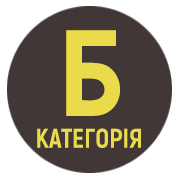BINARY CONCEPTS OF “LIGHT AND DARK” IN HALYNA PAHUTIAK'S NOVEL “THE GENTLEMAN IN A BLACK SUIT WITH SHINY BUTTONS”
DOI:
https://doi.org/10.32782/folium/2024.4.33Keywords:
binary oppositions, concept, conceptosphere, light, darknessAbstract
The article provides a detailed analysis of the binary concepts of “light darkness” in the context of H. Pahutiak's novel “A Gentleman in a Black Suit with Shiny Buttons”. The current state of research in the field of linguistic conceptology, the latest approaches to the study of cognitive oppositions. It is found that the ability of human consciousness to categorize opposites is one of the main ways to classify reality. The concepts of “light-darkness” are considered as a key to forming a picture of the individual's world, as they belong to the primary archetypes rooted in the collective experience of humanity. In the dimension of H. Pahutiak's work, the studied oppositions are presented on several planes of perception. Thanks to the author's unique idiom, her ability to see and make connections, the lexemes “light-darkness” in the novel acquire a variety of interpretations. The main source of diversity of the conceptual sphere in the text are semantically rich, meaningful associations, that arise in the characters of the work on the basis of personal experience and psychological state. The author's attention to the characters' individual perception of the world fills the linguistic canvas of the text with original sememes, while at the same time maintaining the dynamics between the concepts of “light and darkness” as antonymic. It is proved that in H. Pahutiak's novel binary concepts are at the heart of the story. Their variations reflect the situation in society, convey the emotional state of the characters, reveal their personalities, and denote the dimensions of reality, including time and space. The constant tension in the text between the processes around the concepts of light and darkness is a direct mechanism of the plot development, a driver of changes in the characters' thinking, their worldview, and principles, belief systems. This allows the writer to build a unique literary universe based on the universal experience of being. Thus, on the example of H. Pahutiak's work, we can trace the ability of opposites to influence the processes of human cognition. The article aims to expand the understanding of the meaning of binary concepts not only in literary texts but also to reveal their role as a tool for individuals' perception of reality.
References
Бошкань Г. Міфологема сонця у творчості Бруно Шульца та Галини Пагутяк. Вісник Львівського університету : іноземні мови. Львів : Львівський нац. ун-т ім. Івана Франка, 2016. Вип. 24. Ч. 1. С. 2–10.
Давидова Т. Антиконцепт у лінгвістичній ретроспективі. Сучасні тенденції у викладанні іноземних мов у світі : зб. матеріалів учасн. III Міжнар. наук.-практ. інтернет конф. Суми : ФОП Цьома С. П., 2020. С. 30–32.
Жайворонок В. В. Знаки української етнокультури : словник-довідник. Київ : Довіра, 2006. 703 с.
Загнітко А. П. Класифікаційні типології концептів. Лінгвістичні студії : зб. наукових праць. Донецьк : ДонНУ, 2010. Вип 21. С. 12–21.
Краснобаєва-Чорна Ж. В. Концепт ЖИТТЯ в українській фраземіці : автореф. дис. … канд. філол. наук : 10.02.01. Дніпропетровськ, 2008. 20 с.
Пагутяк Г. Пан у чорному костюмі з блискучими ґудзиками. Львів : ЛА «Піраміда», 2016. 280 с.
Селіванова О. Сучасна лінгвістика: напрями та проблеми : підручник. Полтава : Довкілля-К, 2008. 712 с.
Словник української мови : в 11 т. / за ред. А. А. Бурячок, Г. М. Гнатюк. Київ : Наукова думка, 1979. Т. 10. 658 с.
Словник української мови : в 11 т. / за ред. І. С. Назарова. Київ : Наукова думка, 1978. Т. 9. 916 с.
Словник української мови : в 11 т. / за ред. П. П. Доценко, Л. А. Юрчук. Київ : Наукова думка, 1971. Т. 2. 550 с.
Чумаченко М. О. Міфологема світла і темряви в православній культурній традиції : дис. … канд. культ. наук : 26.00.01 / Харківська державна академія культури. Харків, 2018. 224 с.











